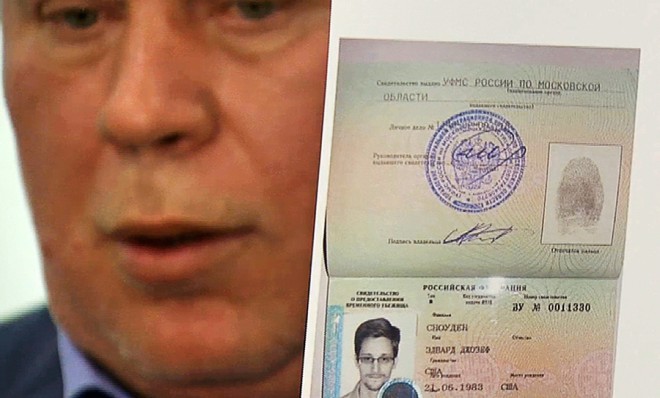Is Edward Snowden finally safe?
Russia grants the NSA leaker temporary asylum, and the U.S. isn't too happy about it


A free daily email with the biggest news stories of the day – and the best features from TheWeek.com
You are now subscribed
Your newsletter sign-up was successful
After five weeks spent holed up in the transit area of a Moscow airport, NSA leaker Edward Snowden finally crossed over to Russian soil on Thursday after his request for temporary asylum was approved.
The move gives Snowden the freedom to move around inside Russia, where he will, for now, be safely out of the reach of American authorities. He has one year to live and work inside Russia while figuring out a more lasting solution.
"Over the past eight weeks we have seen the Obama administration show no respect for international or domestic law, but in the end the law is winning," Snowden said Thursday in a statement released by the anti-secrecy group WikiLeaks. "I thank the Russian Federation for granting me asylum in accordance with its laws and international obligations."
The Week
Escape your echo chamber. Get the facts behind the news, plus analysis from multiple perspectives.

Sign up for The Week's Free Newsletters
From our morning news briefing to a weekly Good News Newsletter, get the best of The Week delivered directly to your inbox.
From our morning news briefing to a weekly Good News Newsletter, get the best of The Week delivered directly to your inbox.
However, Snowden's ordeal is far from over. American prosecutors have charged him in absentia with violating the Espionage Act, and the White House, furious over Russia's decision to let him hang around, is exploring options for getting him back.
White House Press Secretary Jay Carney said that the U.S. was "extremely disappointed" with Russia's decision, and that there was "ample legal justification" for Russian authorities to extradite Snowden to the U.S. He added that President Obama may skip a planned summit with Russian President Vladimir Putin to protest the move.
The U.S. could also pressure Russia in other ways. Obama could skip September's G20 meeting in Russia, or propose that it be moved elsewhere. Sen. Charles Schumer (D-N.Y.) floated the latter idea in a fiery statement, saying, "Russia has stabbed us in the back, and each day that Mr. Snowden is allowed to roam free is another twist of the knife."
Sen. Lindsey Graham (R-S.C.) has even suggested that the U.S. boycott the 2014 Winter Olympic Games in Sochi, Russia, though his colleagues have uniformly said that would be a terrible idea.
A free daily email with the biggest news stories of the day – and the best features from TheWeek.com
Whether any of those actions would actually help the U.S. apprehend Snowden is yet to be seen. Putin has shown no willingness to bow to U.S. pressure thus far, saying that Snowden is welcome in Russia so long as he doesn't leak any more embarrassing intel about the U.S.
Snowden asked Russia earlier this month to harbor him temporarily while he worked out a safe route to a more permanent home elsewhere. A handful of Latin and South American countries have offered to take him in, but the complicated logistics of flying halfway around the world without being intercepted by the U.S. or its allies have kept Snowden grounded.
An international Hail Mary aboard commercial flights could force Snowden to pass through airspace or airports where American allies — or other nations, given the right prodding — could pick him up. Snowden ditched a flight bound for Cuba in June for fear U.S. authorities would catch him en route. And a plane carrying Bolivian President Evo Morales was forced down over Europe in early July over suspicions Snowden was on board. (Morales has since told Snowden he's welcome in Bolivia any time.)
Snowden's lawyer said his client had no plans to leave Russia any time soon. In the meantime, Snowden is taking every precaution to remain in seclusion as much as possible. Accompanied by a WikiLeaks representative, he snuck out of the airport to elude reporters, and is bound for an undisclosed location.
"He is the most wanted man on planet Earth," Snowden's lawyer, Anatoly Kucherena, told Reuters. "He has to think about his personal security. I cannot tell you where he is going."
Jon Terbush is an associate editor at TheWeek.com covering politics, sports, and other things he finds interesting. He has previously written for Talking Points Memo, Raw Story, and Business Insider.
-
 6 exquisite homes with vast acreage
6 exquisite homes with vast acreageFeature Featuring an off-the-grid contemporary home in New Mexico and lakefront farmhouse in Massachusetts
-
 Film reviews: ‘Wuthering Heights,’ ‘Good Luck, Have Fun, Don’t Die,’ and ‘Sirat’
Film reviews: ‘Wuthering Heights,’ ‘Good Luck, Have Fun, Don’t Die,’ and ‘Sirat’Feature An inconvenient love torments a would-be couple, a gonzo time traveler seeks to save humanity from AI, and a father’s desperate search goes deeply sideways
-
 Political cartoons for February 16
Political cartoons for February 16Cartoons Monday’s political cartoons include President's Day, a valentine from the Epstein files, and more
